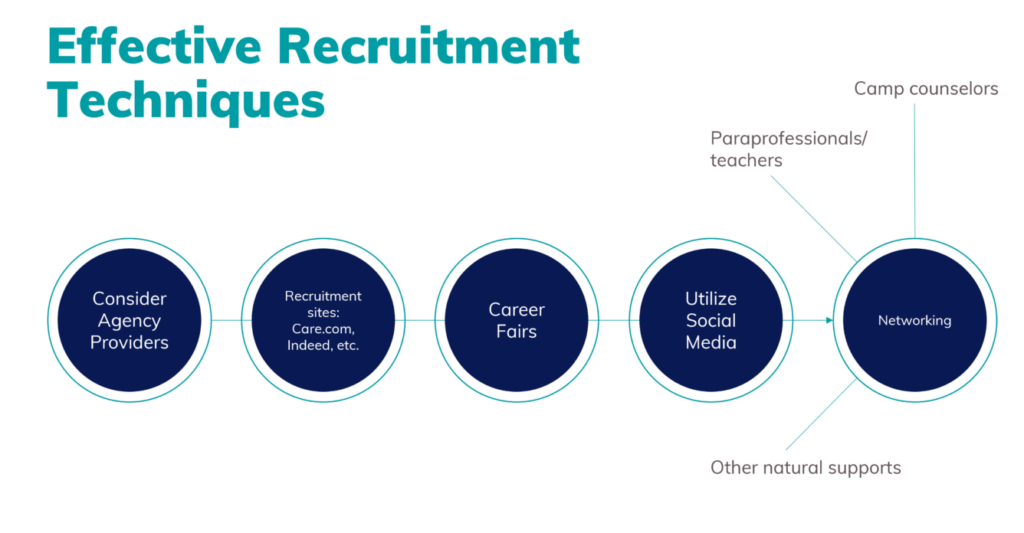Whether we have a loved one with a disability or neurotypical children, we’ve all navigated the process of hiring babysitters or caregivers at some point. However, when it comes to loved ones with higher levels of need, we must approach this process with greater intentionality and purpose. We must think not only about the present but also about the long term.
As parents, we all know that ensuring the well-being of our loved ones is vitally important, and finding the right caregiver is key to this process.
Anna Maki is a proud mom of a 31-year-old young man living with a mild intellectual disability and Autism. Anna is the Director of Program Services at Bobby Dodd Institute (BDI).
In this article, she talks about why selecting the right caregiver is so important and how to build a caregiver profile that takes into account the needs, interests, wants, and expectations of our loved one. Then, she covers the hiring process. She also shares many of her best practices—strategies that have worked for her family over the past 31 years of raising her son.
The Importance of Choosing the Right Caregiver
There is nothing more important than ensuring the safety and well-being of our loved ones. Finding the right person to entrust with their care is a significant responsibility. We’re not talking about just any job—this isn’t about managing widgets or tasks that can be replaced or fixed. This is about selecting someone who will be deeply involved in our loved one’s life, promoting their safety and overall well-being.
Unfortunately, we too often see tragic stories in the news about abuse in caregiving situations that makes us as parents reluctant to hiring long-term help. This, however, can impact our children’s future in many ways.
“I’ve spoken with many families who are hesitant to bring in a caregiver. They worry about the potential for abuse or simply don’t feel ready to let go. But the cold, hard truth is that we, as parents or primary caregivers, are likely to pass away before our loved ones. Preparing our loved ones to trust and connect with others outside of the family structure is critical. A skilled caregiver can enhance their quality of life, providing companionship, life skills development, and support that enables them to thrive,” says Anna Maki.
Beyond protecting against abuse, we need to be purposeful about finding a caregiver whose traits and qualities align with our loved one’s needs, ensuring a perfect fit. Inviting someone into our lives and entrusting them with our most cherished family member is a profound challenge.
Caregivers play a crucial role in helping our loved ones maintain existing relationships and build new ones. Expanding social networks and growing meaningful connections outside the family can significantly improve their quality of life. Establishing a caregiver model that supports ongoing engagement in activities and relationships is an important step in building a more successful future for our loved ones.
Building a Caregiver Profile
When searching for a caregiver, it’s important to adopt a person-centered approach. This means starting with a deep understanding of our loved one’s specific needs and preferences.
- Medical Needs
If your loved one requires medical support—such as assistance with a tracheostomy, incontinence care, or other medical interventions—these needs must be prioritized.
- Behavioral Needs
Consider any behavioral challenges and identify caregivers who have the skills and temperament to address them.
- Shared Interests
Think about the activities your loved one enjoys. Do they like sports? Being outdoors? Gaming? Bowling? Matching interests can make the caregiver-loved one relationship more meaningful and enjoyable.
A caregiver’s natural energy, personality, and outlook on life are critical factors to consider. Similarly, think about your loved one’s personality. Are they introverted or extroverted? Matching personalities can create a more harmonious relationship.
Essential Qualities in a Caregiver
While every situation is unique, there are certain universal qualities to look for in a caregiver.
Reliability as it relates to punctuality and consistency are critical. Look for kindness and compassion. Caregivers should genuinely care about your loved one, not view the role as just a job or a gig to help them earn extra money. Empathy includes understanding and identifying with your loved one’s feelings and having an appreciation for their challenges. Respect is another important trait. Caregivers must treat your loved one with dignity, acknowledging their strengths and respecting their adulthood.
“I’ve always prioritized hiring positive people. Positivity is not something you can train—it’s an innate quality,” emphasized Anna. A naturally positive attitude helps create a supportive environment.
Caregivers must be flexible and adaptable. They must be able to adjust to changing needs and situations.
Here are some key qualities to look for in a caregiver:
- Reliable
- Caring and compassionate
- Empathetic
- Pragmatic
- Observant
- Respectful
- Patient
- Positive
- Flexible and adaptable
Key Skills in a Caregiver
In addition to qualities, you must also look for certain skills that may distinguish between a caregiver and the perfect caregiver.
Time management is an essential skill. Caregivers need to manage schedules effectively, ensuring routines are followed.
Clear and consistent communication is also vital. Caregivers must report on daily activities and document progress, especially in situations where waiver funds are involved.
Familiarity with your loved one’s medical condition and the ability to respond appropriately are critical.
The key skills to look for in a caregiver include:
- Time management
- Planning and organization
- Problem solving and critical thinking
- Communication and reporting
- Medical knowledge–familiarity with diagnoses and conditions
- Observation and attention to detail
- Cultural competency and respect
- Patience and understanding
- Physical stamina and strength
Recruitment Techniques
Finding the right caregiver often requires creativity and persistence. One of the main questions is, “Where do we begin?” There are multiple places that could help you initiate the process. It depends on your personal situation, comfort levels, and experiences. Below are some suggestions to help you get the process started.

Agencies are a good place to look at first. They have established processes and a plenty of experienced caregivers. Another plus is that they can provide a fallback caregiver in case of absences. “My biggest successes, however, have been with word of mouth. Current caregivers often know others in the field,” Anna suggested.
Another option would be websites like care.com. They can connect you with potential candidates. Let’s not forget social media. Posting on platforms like Facebook can help tap into personal networks. Career fairs, on the other hand, provide opportunities to meet candidates face-to-face.
When interviewing candidates:
- Follow up promptly with applicants.
- Use a structured and consistent interview process.
- Conduct background checks.
- Focus on understanding the candidate’s motivation for caregiving.
Caregivers should maintain professionalism and respect boundaries while adopting a person-centered approach. They must see your loved one as an individual deserving of dignity and respect, not as a child to be patronized. Professionalism, mindfulness, and respect for personal and professional boundaries are crucial.
Hiring the right caregiver is about more than just filling a role. It’s about building a relationship that ensures your loved one’s safety, well-being, and quality of life. By carefully considering qualities, skills, and recruitment techniques, you can find a caregiver who not only meets your loved one’s needs but also becomes a valued part of their support network.
If you are a caregiver or want to support your loved one’s caregiver, here is a practical survival guide to help you confidently navigate the challenges of this important role.




